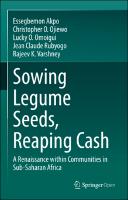Sowing Legume Seeds, Reaping Cash
A Renaissance within Communities in Sub-Saharan Africa
| dc.contributor.author | Akpo, Essegbemon | |
| dc.contributor.author | Ojiewo, Christopher O. | |
| dc.contributor.author | Omoigui, Lucky O. | |
| dc.contributor.author | Rubyogo, Jean Claude | |
| dc.contributor.author | Varshney, Rajeev K. | |
| dc.date.accessioned | 2020-06-15T15:11:00Z | |
| dc.date.available | 2020-06-15T15:11:00Z | |
| dc.date.issued | 2020 | |
| dc.identifier | ONIX_20200615_9789811508455_59 | |
| dc.identifier | OCN: 1148168928 | |
| dc.identifier.uri | http://library.oapen.org/handle/20.500.12657/39586 | |
| dc.description.abstract | This open access book shares impact stories – testimonies from various value chain actors who have been part of the Tropical Legumes (TL) projects, over the past twelve years. The Tropical Legumes projects led by ICRISAT in three parts (TLI, TLII and TLIII), constitute a major international initiative supported by the Bill & Melinda Gates Foundation (BMGF) and jointly implemented by the International Center for Tropical Agriculture (CIAT), International Institute of Tropical Agriculture (IITA) and National Agricultural Research Systems (NARS) partners from Sub-Saharan Africa and India. The project developed improved cultivars of common bean, cowpea, chickpea and groundnut (but also soya bean and pigeon pea cultivars in its initial phases) and delivers their seed to smallholders in BMGF-focus areas. It also strengthens the NARS and CGIAR's breeding programs and seed platforms to enhance their ability to deliver high and sustained outputs to smallholder farmers. The book compiles the experiences of a diversity of actors within the grain legume value chains, with a focus on groundnut and common beans in Tanzania and Uganda, groundnut and cowpea in Nigeria, and groundnut in Ghana. All stakeholders involved share their thoughts on being part of a decade-long development project family. National agricultural research institutes, knowledge brokering organizations, NGOs, public and private seed companies, agro-dealers, individual seed entrepreneurs, farm-implement makers, farmer cooperatives, farmer groups, individual men and women farmers, middlemen, processors, traders and consumers were all involved in this project, and as such this book provides valuable insights for development workers, technical staff, and project managers. | |
| dc.language | English | |
| dc.subject.classification | thema EDItEUR::T Technology, Engineering, Agriculture, Industrial processes::TV Agriculture and farming::TVB Agricultural science | en_US |
| dc.subject.classification | thema EDItEUR::P Mathematics and Science::PS Biology, life sciences::PST Botany and plant sciences | en_US |
| dc.subject.other | Agriculture | |
| dc.subject.other | Plant Breeding/Biotechnology | |
| dc.subject.other | Plant Anatomy/Development | |
| dc.subject.other | Plant Genetics and Genomics | |
| dc.subject.other | Plant Biotechnology | |
| dc.subject.other | Plant Development | |
| dc.subject.other | Plant Genetics | |
| dc.subject.other | Grain legume productivity | |
| dc.subject.other | improved varieties | |
| dc.subject.other | impact stories | |
| dc.subject.other | Sub-Saharan Africa | |
| dc.subject.other | multi-stakeholders | |
| dc.subject.other | Open access | |
| dc.subject.other | Agricultural science | |
| dc.subject.other | Botany & plant sciences | |
| dc.subject.other | Biotechnology | |
| dc.subject.other | Developmental biology | |
| dc.subject.other | Genetics (non-medical) | |
| dc.title | Sowing Legume Seeds, Reaping Cash | |
| dc.title.alternative | A Renaissance within Communities in Sub-Saharan Africa | |
| dc.type | book | |
| oapen.identifier.doi | 10.1007/978-981-15-0845-5 | |
| oapen.relation.isPublishedBy | 6c6992af-b843-4f46-859c-f6e9998e40d5 | |
| oapen.imprint | Springer | |
| oapen.pages | 106 | |
| oapen.place.publication | Singapore |

